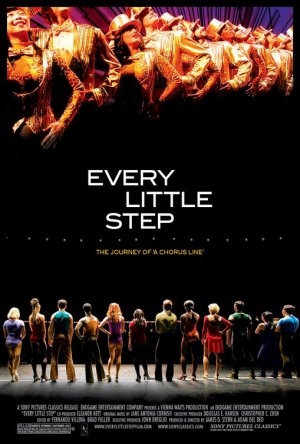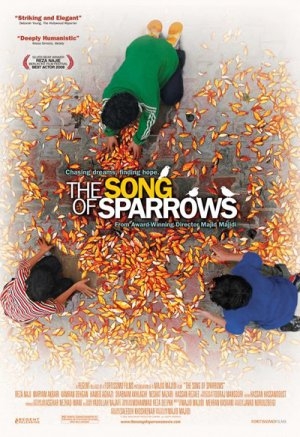 EVERY LITTLE STEP (2008. directed by Adam Del Dio & James D. Stern, 96 minutes, U.S.)
EVERY LITTLE STEP (2008. directed by Adam Del Dio & James D. Stern, 96 minutes, U.S.)
SONG OF THE SPARROWS (2008, directed by Majid Majidi, 96 minutes, Iran)
BY DAN BUSKIRK FILM CRITIC
Among the least successful adaptations from stage to screen, Richard Attenborough’s 1985 film version of A Chorus Line seems to continually put its wrong foot forward. Casting actors with slight dance skills (Audrey Landers of the Landers Sisters?), shooting dancers from the knees up and needless cutaways busting in mid-song; this deserved flop thoroughly killed the soul of the behind-the-scenes dance musical. Twenty-some years later, this documentary centered around the 2006 Broadway revival does a much better job of capturing that “singular sensation” of the Pulitzer Prize winning show.
In a clever bit of framing, Every Little Step dissects the show in three separate forms. The show’s creator, six-time Tony winner Michael Bennett, began his career at sixteen in a touring production of West Side Story and his knowledge of the travails of a dancer’s life helped gave birth to the show. We hear excerpts from his original research tapes, capturing the real life stories that would be turned (often verbatim) into the show’s monologues. We also have the show’s original stars on hand to give their memories of the 1975 debut. Finally we have the hopeful auditioning dancers who are looking for a slot in the 2006 Broadway remounting of the show, bringing their own stories and barely-disguised desperation to the film.
Bennett’s spirit lingers throughout the documentary. Besides A Chorus Line, which ran for the whooping fifteen years, he directed hits like Follies and Dreamgirls before becoming an early casualty of the AIDS epidemic in 1987. The footage and recordings of the man make you yearn for what we missed in this career cut short; his fire and intelligence dominates the film when he takes center stage. Like the play’s autobiographical character Zach, Bennett pushed the actors mercilessly and the original performers are thankful in their remembrances of this fascinating, driven man.
Then there is the hopeful dancers, sixteen hundred of which auditioned for the ’06 revival. Most of them proclaim “this character is me” and it’s apparent that the lives of an aspiring Broadway dancers hasn’t changed much in thirty years. With the breakdowns, tears and the rare knock-em-dead tryouts, the drama smacks of reality TV, perhaps accounting for its voyeuristic irresistibility. Particularly smashing is Jason Tarn, who brings the producers to tears while reading the character of Paul’s coming-out monologue. “Hire him!” the producer barks, wiping his eyes in one of those scenes that feels both cliche and true.
At ninety-six minutes Every Little Step is stuffed with both anecdote and those indestructible songs (from the melodiously gifted Marvin Hamlisch), while capturing an absorbing variation of the show’s timeless story. They often say the antics on the set are better than what ends up in the show which may be the case here: Every Little Step is a riveting time at the movies where the 2006 Broadway revival floundered with weak reviews. Such is the difference between the flexible magic of film and the hard reality of the stage.
– – – – – – –
 Funny how the specific tropes of the Iranian New Wave of cinema have become so entrenched; impish children, swimming goldfish (signifying hope and good luck), and the documentary-like studies of working people’s lives. Majid Majidi hit all of these notes in his Oscar-nominated Children of Heaven and what do yo know, he revisits them again in his latest film Song of the Sparrows. I guess if you love Westerns you don’t tire of seeing saloon fights and showdowns on Main Street, if you enjoy the Iranian New Wave here’s another well-observed look at the hopeful lives of the hard luck people of Iran.
Funny how the specific tropes of the Iranian New Wave of cinema have become so entrenched; impish children, swimming goldfish (signifying hope and good luck), and the documentary-like studies of working people’s lives. Majid Majidi hit all of these notes in his Oscar-nominated Children of Heaven and what do yo know, he revisits them again in his latest film Song of the Sparrows. I guess if you love Westerns you don’t tire of seeing saloon fights and showdowns on Main Street, if you enjoy the Iranian New Wave here’s another well-observed look at the hopeful lives of the hard luck people of Iran.
Mohommad Amir Naji (the father from Children of Heaven) is the overwhelmed father Karim, barely making ends meet while working at a rural ostrich farm. When one of the ostriches gets by Karim and makes a break for the hills you see that the man is envious of the bird’s improbable freedom. Karim would like to be that bird (he even dresses up as an ostrich in an attempt to lure the ostrich back) and escape out from under his stifling job. He gets his chance when he travels into Tehran and realizes that he can make a living taxiing folks around on the back of his small motorbike.
Despite coming from a government with its share of censorious history, Majidi is free to suggest that it takes more than hard work and tenacity to pull yourself up from the bootstraps in modern day Iran. In a darkly humorous chain of events, every step up for Karim devolves into two steps back. Meanwhile, his young son has ambitions of his own, hoping to raise a school of goldfish into bounty of salable fishes. “I’ll be a millionaire!” the kid dreams.
Both of their plans are dashed before the tale is over and while Karim might be headed back to the ostrich farm, Majidi can’t quite bring himself to leave the young son without a least a glimmer of hope. He’s too much of a humanist to strand the next generation in such hopeless poverty of the spirit. To paraphrase that old Ellington tune, why one should tear the seam ofanyone’s dreams is over his head.
